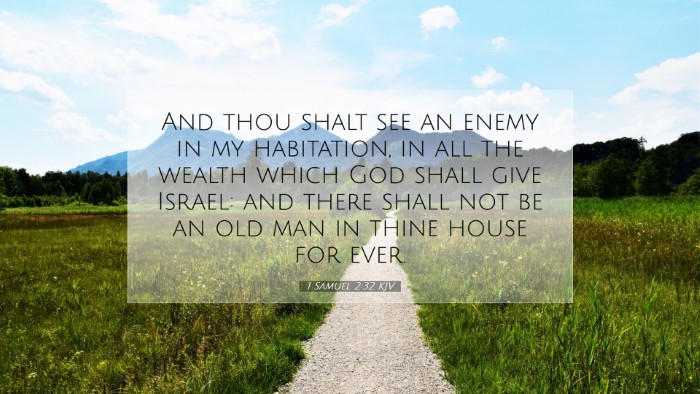Commentary on 1 Samuel 2:32
Bible Verse: "And thou shalt see an enemy in my habitation, in all the wealth which God shall give Israel: and there shall not be an old man in thine house for ever."
Introduction
This verse, situated within the context of God's judgment against the house of Eli, encapsulates significant themes of divine sovereignty, the consequences of unfaithfulness, and the fulfillment of God's promises. It serves as a pivotal point in the narrative of 1 Samuel, illustrating profound truth for God's people, including pastors, students, theologians, and scholars.
Contextual Background
The broader narrative of 1 Samuel addresses Israel's transition from a theocratic to a monarchy. Eli, the high priest, had failed to restrain his sons, Hophni and Phinehas, from their corrupt practices within the temple, leading to serious ramifications for his lineage.
Theological Significance
1. God's Judgment: This verse highlights the certainty of judgment. As God pronounces judgment upon Eli, it signifies the direct consequences of failing to lead the people of Israel holistically and righteously. Matthew Henry notes that God's decree reflects both His justice and the seriousness of Eli's failures.
2. Loss of Priesthood: The phrase, "there shall not be an old man in thine house for ever," speaks of the complete eradication of Eli’s lineage from priestly duties. Albert Barnes emphasizes that when God withdraws His blessing from a household, it can result in total spiritual barrenness.
Commentary Insights
- Matthew Henry: He postulates that Eli's indifference to the sins of his sons resulted in a generational curse, where the priesthood of Eli's descendants was terminated. His commentary encourages readers to reflect on the responsibilities of leadership and the severe consequences of neglect.
- Albert Barnes: Barnes expands on the implications of ‘seeing an enemy in my habitation’ as a prophetic declaration of the struggles that would arise when God’s favor is lifted. The mention of wealth signifies the material blessings of Israel, yet these are contrasted with the inevitable judgment that follows unfaithfulness.
- Adam Clarke: Clarke notes the tragic irony in the former greatness of Eli’s house, from which they would now face shame and loss. He emphasizes the importance of steadfastness in faith and the danger posed when leaders allow corruption to prosper unchecked.
Practical Applications
1. Accountability in Leadership: This verse serves as a stark reminder to leaders in the Christian faith about the weight of their responsibilities. Their actions not only affect themselves but also their families and congregations.
2. The Seriousness of Sin: The destructive patterns of sin, as evidenced in Eli's story, demonstrate God’s displeasure and the swift consequences that follow. Pastors and theologians should communicate the importance of righteousness not just in personal life but also in ministry.
3. Hope in God’s Sovereignty: While this passage reveals judgment, it also serves as a reminder that God’s plan prevails even through judgment. The promise of a faithful priest, as hinted in subsequent verses, portrays God's commitment to redeem His people despite their failures.
Conclusion
1 Samuel 2:32 stands as a sobering reminder of the gravity of leadership and the impact of sin not only in individual lives but across generations. The commentaries by Matthew Henry, Albert Barnes, and Adam Clarke collectively encourage a deeper understanding of God's nature as just and merciful, inviting readers into a space of reflection, repentance, and a renewed commitment to holiness.


